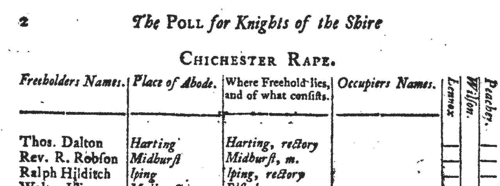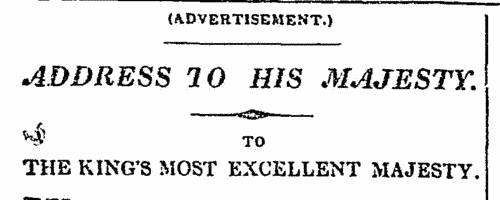Poyle Surname Ancestry ResultsOur indexes 1000-1999 include entries for the spelling 'poyle'. In the period you have requested, we have the following 15 records (displaying 11 to 15): Buy all | | | Get all 15 records to view, to save and print for £70.00 |
These sample scans are from the original record. You will get scans of the full pages or articles where the surname you searched for has been found. Your web browser may prevent the sample windows from opening; in this case please change your browser settings to allow pop-up windows from this site. Yorkshire Feet of Fines
(1571-1584)
Pedes Finium - law suits, or pretended suits, putting on record the ownership of land in YorkshirePOYLE. Cost: £4.00.  | Sample scan, click to enlarge

| Voters in Hastings rape, Sussex
(1774)
A poll of freeholders to elect two knights of the shire to represent the county of Sussex was taken at Chichester in 1774. This poll book lists each voter's full name; abode; where the freehold lay and of what it consisted (b., barn; f., farm; g., garden; h., house; l., land; m., mill; o., orchard; r., rectory; w. sh., workshop); and the name of the occupier (if any) (often surname only); with dashes in the right-hand columns indicating votes for the candidates, Lord George Henry Lennox, sir Thomas Spencer Wilson and sir James Peachey. The franchise was limited to freeholders of 40 shillings per annum and more. The sample scan shows part of Chichester rape. The rape of Hastings included Hastings and Winchelsea and the surrounding countryside.POYLE. Cost: £6.00.  | Sample scan, click to enlarge

| Merchants, Bankers, Shipowners and Traders of London
(1834)
The public prints of December 1834 carried this loyal address to king William IV of merchants, bankers, shipowners, traders and others connected with the city of London, requesting 'permission at the present juncture to address your Majesty for the purpose of renewing the expression of our dutiful and loyal attachment to your Majesty’s person and crown. Deeply sensible of the practical blessings we have hitherto enjoyed under our wisely mixed constitution of King, Lords, and Commons, and feeling that the free and legitimate exercise of the Royal prerogative forms an integral part of that constitution (as essential to the maintenance of our own liberties as to the power and dignity of the Throne), we beg humbly to assure your Majesty of our determination steadfastly to uphold the same by every means in our power.
'Feeling, in common with all classes of your Majesty’s subjects, the deep importance of applying to all real abuses, wherever they may be found, a wholesome and timely correction, and of effecting in our excellent institutions every improvement of which careful examination and experience may prove them to be susceptible, we desire further dutifully to express our entire confidence that these useful purposes will ever occupy your Majesty’s paternal care. Nor can we permit ourselves to believe that the importance of these objects will be less apparent to those to whom the powers of government have been recently intrusted.'
Full names are given (or surname with initials), and address. Over 5000 subscribed.
POYLE. Cost: £6.00.  | Sample scan, click to enlarge

|  Persons of standing recommending London police recruits
(1843-1857) Persons of standing recommending London police recruits
(1843-1857)
The Metropolitan Police Register of Joiners (MEPO 4/334) lists policemen joining the force 1 January 1843 to 1 April 1857 (warrant numbers 19893 to 35804). The register is alphabetical, in so far as the recruits are listed chronologically grouped under first letter of surname. It gives Date of Appointment, Name, Number of Warrant, Cause of Removal from Force (resigned, dismissed, promoted or died), and Date of Removal. Although the register was closed for new entrants at the end of 1842, the details of removals were always recorded, some being twenty or more years later. Those recruits not formerly in the police, the army, or some government department, were required to provide (normally) at least two letters of recommendation from persons of standing, and details of these are entered on the facing pages. Where a recruit was only recently arrived in the metropolis, the names and addresses of the recommenders can be invaluable for tracing where he came from. Those recruits not formerly in the police, the army, or some government department, were required to provide (normally) at least two letters of recommendation from persons of standing, and details of these are entered on the facing pages: the names in these are indexed here (the police recruits are indexed separately and not included here). Recruits transferred from other forces or rejoining the force did not normally need recommendations - in the latter case, former warrant numbers are given - but some recommendations are from police inspectors, even other constables. Recruits coming from the army sometimes have general military certificates of good conduct, but most often have a letter from their former commanding officer; recruits recommended by government departments (most often the Home Office) similarly have letters from the head of department. But the great majority of the names and addresses in these pages are of respectable citizens having some sort of personal acquaintance with the recruit. Where more than two recommendations were provided, the clerk would only record one or two, with the words 'and others'. Tradesmen are sometimes identified as such by their occupations; there are some gentry. Although the bulk of these names are from London and the home counties, a scattering are from further afield throughout Britain and Ireland. POYLE. Cost: £8.00.  | Sample scan, click to enlarge

| Long-stay Paupers in Workhouses: Guildford
(1861)
This comprehensive return by the Poor Law Board for England and Wales in July 1861 revealed that of the 67,800 paupers aged 16 or over, exclusive of vagrants, then in the Board's workhouses, 14,216 (6,569 men, 7,647 women) had been inmates for a continuous period of five years and upwards. The return lists all these long-stay inmates from each of the 626 workhouses that had been existence for five years and more, giving full name; the amount of time that each had been in the workhouse (years and months); the reason assigned why the pauper in each case was unable to sustain himself or herself; and whether or not the pauper had been brought up in a district or workhouse school (very few had). The commonest reasons given for this long stay in the workhouse were: old age and infirm (3,331); infirm (2,565); idiot (1,565); weak mind (1,026); imbecile (997); and illness (493). POYLE. Cost: £6.00.  | Sample scan, click to enlarge

|
 | 1 | 2 |
Research your ancestry, family history, genealogy and one-name study by direct access to original records and archives indexed by surname.
|








